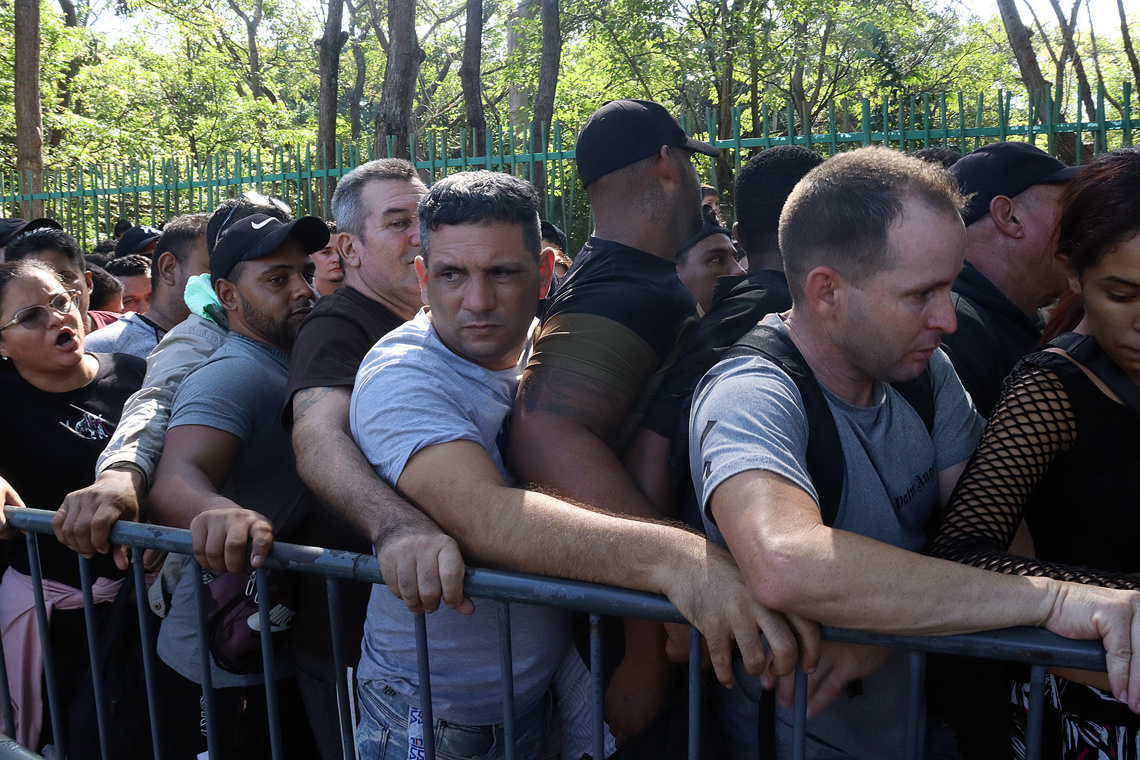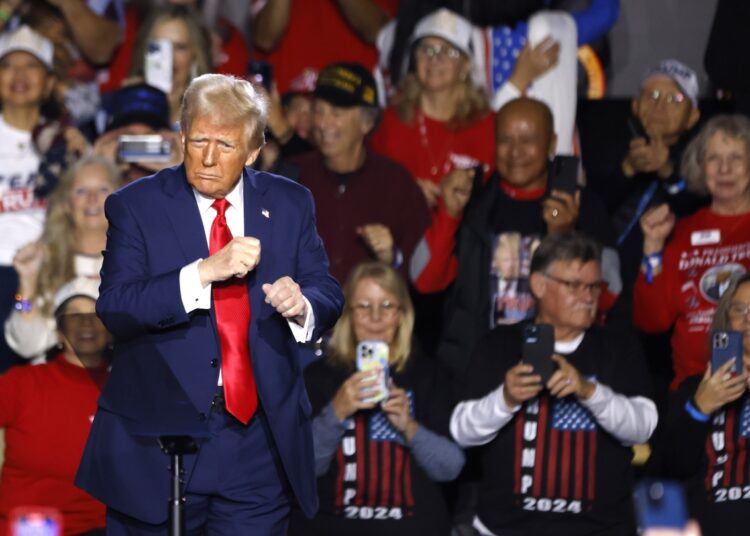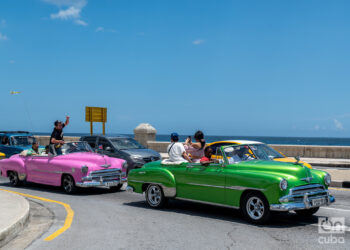A policy based on threat and intimidation can be effective, even if it never carries out what it presages. Not only because of its deterrence ― a concept as old as the art of war ― but because it can provoke concern, anxiety and tension in the adversary, which makes it difficult for him to act with equanimity, for fear of unforeseen consequences, exposing himself to reprisals for movements that are interpreted as hostile, locking himself into a defensive mode (fueled by the mentality of a besieged fortress), contributing to an extreme caution that tends to slow down or even paralyze decision-making, by prolonging the wait-and-see attitude, until seeing where these bad presages are defined and carried out.
A policy of threat and intimidation, more credible the greater the strength and means of the one who proclaims it, hangs over others like the classic sword of Damocles.
As I pointed out, none of that, strictly speaking, is new in this arena.
Throughout the Cold War, the United States and the USSR were threatening each other, playing a dangerous nuclear poker game, to which they came extremely close in the 1962 Missile Crisis around Cuba.
The U.S. perception of the Soviet threat that year was so exaggerated as to believe that a USSR with a 16-times-less atomic firepower was going to attempt a first nuclear strike, using as a pretext defending its ally in the Caribbean. That was the determining factor in the origin and escalation of the crisis. If that spiral towards confrontation had not been cut short by the use of presidential powers, and if JFK (and Nikita) had allowed themselves to be dragged along by the consensus of their cabinet, advisors and Joint Chiefs of Staff, we would all be a pile of ashes.
As we know today, in the rest of the Cold War, after 1962, the crazy arms race was never surpassed, nor were bluff, concealment, unilateralism, ultimatums ruled out, over dialogue, cooperation, the search for understanding.
Note how this perception of threat is dangerous, as an autoimmune reaction, on one side and the other. And note how this presidential power (beyond Congress, a right-wing lobby, ideological fanatics marked by an anti-communist obsession in a world where communism is conspicuous by its absence) has a decisive importance, very particularly, in terms of national security.
In a previous article in this column I listed the policies of the Trump-Biden tandem towards Cuba. I ended by saying that the strangling measures had been so many and so varied that it was difficult to imagine what else they were going to do after January 2025. However, I should have added: what else were they going to do that would not be counterproductive for them.
Let’s say, the memoranda of understanding (MOUs), agreements and arrangements signed between the two sides, almost all intact, since the time of Obama and Raul, could be reversed.
The MOUs covered security of travelers and trade, application and compliance with the law (fraud, passport forgery, money laundering), conservation and management of marine protected areas in the Straits of Florida, cooperation in areas of hydrography and geodesy for the safety of maritime navigation, protection of wildlife and land areas, exchange of seismic records, meteorological and climate information, regular flights, direct mail.
The agreements provided for cooperation and response to oil spills in the Gulf of Mexico and the Straits of Florida, air and sea search and rescue, cooperation in animal and plant health, monitoring and coordination of the migration agreement signed in 1994-95, and the ratification of a treaty on the demarcation of continental shelves in the eastern polygon of the Gulf beyond 200 miles.
The arrangements concerned the coordinated fight against illicit trafficking of narcotics and psychotropic substances and transportation security (security officers on board aircraft).
Other MOUs covered cooperation in health, cancer research and development, and twinning of protected areas (Zapata and Everglades).
Some network experts on relations point out that “the United States does not need anything from Cuba” and that “it is absurd to think that it needs relations.” However, this list of agreements, arrangements and MOUs dating from 2014-2017 reflects a symmetry of very specific interests.
A simple inspection shows that almost all of them directly or indirectly concern national security interests. Those that do not change with the political situation or the administrations.
If it were true that Cuba did not do everything within its power to advance negotiations on these or other issues, in particular, the granting of concessions to U.S. companies to invest or trade in Cuba, subsequent events would justify this reluctance.
Cuba was giving the United States a measure of trust by reaching agreements that not even the Obama administration could guarantee — as was later demonstrated. The timid relaxation of some of the blockade regulations never allowed bank loans for authorized commercial operations (sales licenses for food and medicine); nor did it facilitate real access by the private sector to opening accounts in banks there, much less financing; nor did it reduce the persecution of Cuban transactions in the rest of the world, quite the opposite; nor did it reduce surveillance of naturalized subsidiaries in third countries to trade with Cuba; nor did it even give special treatment to Cuban-American capital to carry out operations with the island, under a general license, as occurs with the prerogatives that those born in Cuba or children of Cubans have to visit their homeland — at least, until now.
If they had been adopted, these relaxation measures would have put the ball in the Cuban government’s court. And, above all, they would have created links that would have fostered the emergence of a lobby of economic interests in opposition to the embargo, which would have been there when Trump arrived at the White House in his first term.
Instead, they made the Cuban government feel that advancing national legislation aimed at accelerating those links was like playing Russian roulette, with an ignored bullet in the revolver chamber (plastic or silver?): what Donald Trump, or Hillary Clinton, would do a few months later.
Instead, the Obama administration continued to argue that they could not relax the regulations any further, because that would be like abolishing the Helms-Burton Act, something that only Congress could do. However, the Justice Department could have, let’s say, challenged the Supreme Court on the unconstitutionality of that Act, which many legal experts consider an aberration, and lacking any justification, since, as of 1997, the intelligence and national security community certified that Cuba was not a threat to the United States.
With that sword of Damocles hanging over its head, Cuba took quite a risk in those 25 months of the Obama-Raúl summer. In fact, the reversal of the policy took less than 6 months to take the form of a National Security Presidential Memo 5 (NSPM 5) “Strengthening the Policy of the United States Toward Cuba.” It denied the document that proposed strategic lines toward Cuba promulgated by Obama a few weeks before leaving the White House, and which was supposed to give continuity to the U.S. policy.
The basis of this NSPM 5 put forward the promotion of democracy, freedom and human rights in Cuba, as well as promoting private enterprises. To that end, it prioritized channeling media outside the reach of Cuban institutions, aimed at supporting anti-government organizations here, and especially those based in Miami. All of this was justified by the repression of protests and the freedom of religious worship supposedly practiced by the Cuban government.
Just as a reminder: the NSPM 5 did not move an inch, not even when, less than two years later, a new Constitution was approved, whose article 56 advocated the right to assembly, public demonstration and association; and established bases for private business that were unusual in more than half a century.
If more evidence were needed that agreements on cooperation with the United States suffer from extreme volatility, no matter which party is in power or what Cuba does or does not do, the Trump-Biden tandem practiced the policy of regime change all the time. If one reviews the public conduct of the U.S. Embassy in Havana between late 2020 and July 2021, one will see that it was the same as before the 7/11 protests.
However, during this period of two administrations, the exact opposite of the leitmotiv “Cuba-is-not-doing-what-it-has-to-do-to-contribute-to-improving-relations-with-the-United States” occurred. The case of the 23 agreements inherited from the Obama administration is a perfect example. As I pointed out, the U.S. side responded less and less to the content of these agreements, even though they were not cancelled, as the bilateral meetings under them languished, with most of them remaining in hibernation. So, if they were abolished right now, nothing would change in practical terms.
Curiously, what is never mentioned is that Cuba has not stopped complying with them.
The coordination meetings between Border Patrol Troops (TGF) and the United States Coast Guard (USCG), for example, continued until the end of the Biden administration. According to experts, “(11) TGF-USCG Technical Meetings have been held, where topics such as combating international drug trafficking and illegal immigration by sea, coordination of maritime search and rescue operations, exchanges on port security, and coordination of response to oil spills in the Straits of Florida have been carried out.”
However, although Cuban counterparts continue to comply with the terms of the 2015-2017 agreements and arrangements, most of the other agencies involved (Homeland Security, Justice, DEA, FBI, ICE) have stopped responding, in many cases since the first Trump administration. The reports that Cuba has continued to share cover intelligence data and unilateral actions, as well as proposals for coordination, referring to such sensitive issues as confronting cybercrime, terrorism, drug trafficking, money laundering and other illicit actions, judicial assistance in criminal matters, and human trafficking. Obviously, the attitude of the White House high command towards Cuba has marked this withdrawal of the agencies that previously maintained close collaboration with the island.
Now then, the cancellation of the MOUs, agreements and arrangements of the Obama-Raúl era could prevent these agencies from receiving information on highly sensitive issues, even without reciprocity. Since they are national security issues, maintaining this link is still in the interest of both parties; losing it could harm them more than Cuba.
What else can the Trump 2.0 administration bring out of its arsenal?
In the North there is a somewhat enigmatic phrase, which says chickens come home to roost. It means that bad actions end up affecting the chickens in one’s henhouse.
Of course, this government can suspend remittances, cancel regular flights, block travel to Cuba for those who entered there as political asylum seekers. All of which would be problematic for many Cubans, including those who voted for or sympathize with Trump and his acolytes.
Given that the deportation policy does not seem to grant privileges to those born in Cuba, those deportable could include not only prisoners, criminals, those subject to judicial proceedings, parole, or others without permanent legal residence. Let’s say, those who were once government employees, officials, members of the Communist Party of Cuba (PCC) and the Union of Young Communists, of the Ministry of the Interior or the Ministry of the Armed Forces, held positions in the Committees for the Defense of the Revolution, the Federation of Cuban Women, the Central Organization of Trade Unions, and any other organization. Those who worked in the official media, were members of organizations of artists, writers, journalists; or performed in events before figures of the government and the PCC, or in official institutions and spaces, including the Plaza de la Revolución itself.
If this policy of punishment, amplified to the degree of ideological revenge against all those who “got along with Castroism,” were really applied, as a country friend of mine would say, “believe me, things are going to get bad, not only for this chicken coop, but for that one over there.”
Observers of the political scene with whom I talk say that those Cubans affected by such drastic measures would never dare to publicly oppose the Trump government, or to take to the streets in protest. I suppose they are right. They say that this is because they have become accustomed to being silent here, to not expressing their disagreements with the government, to resigning themselves or “getting along” in informal ways of survival.
I confess that I do not know Cubans who are so silent here, but I agree that challenging the “politically correct” there could be less likely. Because that majority, more silent there than here, is today responding to a pattern of assimilation that prevails on that side: that of an ideologically intransigent Cubanness. Acculturation, as anthropologists call it.
However, there are other forms of political expression, more closely linked to personal conduct than to speeches. Let us say, voting against local politicians who support measures that harm them and their families. In addition to violating them, as has happened before. Since, according to the experience of these years, when it comes to protecting the family, the fear of punishment is much less of a deterrent.
For some observers, the witches of this horror story are the U.S. politicians Rubio and Claver-Carone, who have never set foot in Cuba. They could put pressure to undo the migration agreement, contrary to Trump’s policy in his first term. If they did, the mechanism of cooperation in the search and rescue of migrants and the pursuit of drug trafficking in the Caribbean would be put to an end. But, above all, an additional problem would be created: not being able to negotiate with the Cuban government the deportation of its nationals. As is known, threatening to raise tariffs on Cuban products in the United States is pointless, because we already have a blockade.
Finally, placing Cuba in the context of U.S. policies towards Latin America and the Caribbean allows us to better weigh what is possible and what is real.
These dramatic measures of the first 100 days, let’s say, deportations, may be effective in the short term. Now, what will happen to all those who are currently being deported to Colombia, Mexico, Venezuela…? Will they stay put or will they try to cross the border again and again? As experience shows, things are not so simple.

In these times of Armageddon, I imagine a great statesman and strategist accustomed to looking at the world, especially our region, facing the hostility of a formidable enemy. Like a chess master, without underestimating the threats of the other, nor letting himself be carried away by his snubs, he would calculate the possible consequences of these measures of force, based on his real power, as well as on his illusion of omnipotence.
Surely, Fidel Castro would be anticipating the variants in the other’s game, ready to deal with the weaknesses of his excessive confidence. And, as he used to, especially under bad weather conditions, he would be weaving alliances against the common enemy, without ideological requirements or partisan exclusions, on this side, and also on that side.
As well as without letting himself be provoked or deafened — the poet would say — by the “voices that presage war.”










